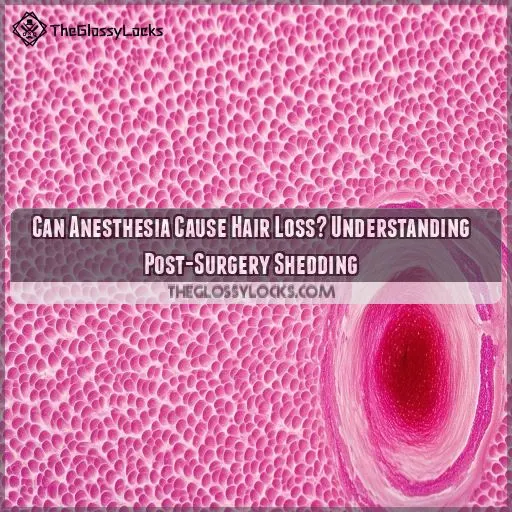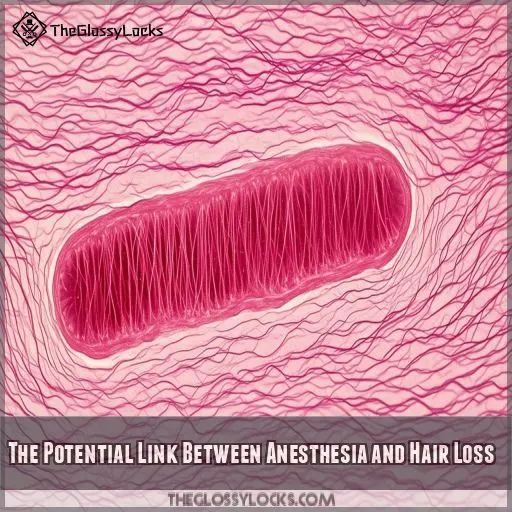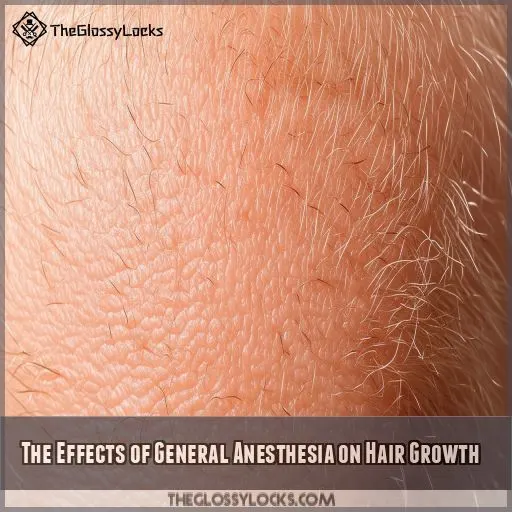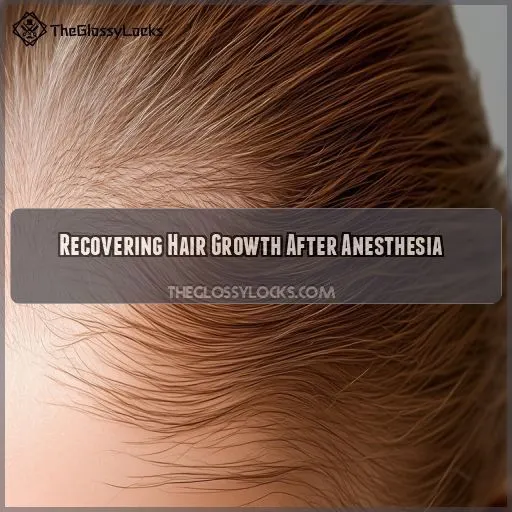This site is supported by our readers. We may earn a commission, at no cost to you, if you purchase through links.
 Do you notice more hair shed after surgery? Don’t worry; you are not alone. Many patients ask: Can anesthesia cause hair loss?
Do you notice more hair shed after surgery? Don’t worry; you are not alone. Many patients ask: Can anesthesia cause hair loss?
Though it is not a direct cause, the individual administering anesthesia and, by extension, surgical stress may potentially interrupt the normal hair cycle. In a few moments, we will delve into a relationship where causal factors predispose to hair loss post-surgery.
We will also discuss how anemia and other medical conditions, combined with general anesthesia, can affect the health of hair and lead to recovery of hair growth following such procedures
Table Of Contents
- Key Takeaways
- Can Anesthesia Cause Hair Loss?
- The Potential Link Between Anesthesia and Hair Loss
- Understanding Anemia and Its Impact on Hair Health
- The Effects of General Anesthesia on Hair Growth
- Recovering Hair Growth After Anesthesia
- Frequently Asked Questions (FAQs)
- Can anesthesia cause hair loss?
- Can anemia cause hair loss?
- Does general anaesthetic cause hair loss?
- How does anesthesia affect hair growth?
- Can certain types of anesthesia increase hair loss risk?
- How long after surgery might anesthesia-related hair loss occur?
- Are there preventive measures to minimize hair loss post-anesthesia?
- Does age affect anesthesia-induced hair loss likelihood?
- Can repeated anesthesia administrations compound hair loss effects?
- Conclusion
Key Takeaways
- Anesthesia itself doesn’t directly cause your hair to pack its bags and leave, but it can disrupt your hair’s normal growth cycle. Think of it as your locks taking an unexpected vacation – they’ll be back, but you might notice some empty beach chairs on your scalp for a while.
- Surgical stress is the real culprit here. Your body’s like a drama queen, overreacting to the whole ordeal and potentially throwing your hair follicles into a tizzy. But don’t worry, this hair-raising experience is usually just a temporary plot twist in your life story.
- Anemia might be playing a supporting role in your hair loss saga. When your iron levels are lower than a limbo stick, your body focuses on keeping the main show running, sometimes leaving your hair growth as an overlooked understudy.
- Recovery is like growing a garden – it takes time and TLC. Most folks see their hair make a comeback within 3-6 months. In the meantime, treat your scalp like a VIP – good nutrition, gentle care, and maybe even a relaxing massage to get those follicles feeling fabulous again
Can Anesthesia Cause Hair Loss?
Yes, anesthesia can cause hair loss. After surgery, you might experience temporary shedding called telogen effluvium, typically occurring 2-4 months post-op. This happens because anesthesia can disrupt your hair’s natural growth cycle.
Don’t panic, though – it’s usually not permanent. Your locks should start bouncing back within 6-12 months.
Factors like the type and duration of anesthesia, your overall health, and stress levels can influence the severity. While you can’t completely prevent it, maintaining a balanced diet and gentle hair care routine can help.
There’s more to the story of anesthesia and your tresses, so let’s unravel the hairy details
The Potential Link Between Anesthesia and Hair Loss
You may experience hair loss after undergoing anesthesia due to various factors affecting hair growth cycles. Anesthesia can disrupt normal hair follicle function, potentially leading to temporary shedding known as telogen effluvium, which typically resolves within several months post-surgery
Anesthesia and Its Effects on Hair Growth
You’ve probably heard whispers about anesthesia causing hair loss, but what’s the real story?
While it’s not a direct cause, anesthesia can disrupt your hair’s natural growth cycle.
The medications used during surgery, combined with hormonal changes and surgical stress, can throw your locks for a loop.
It’s like your hair decides to take an unexpected vacation, leaving you wondering where it went!
Factors That May Contribute to Hair Loss After Anesthesia
While anesthesia itself isn’t directly linked to hair loss, several factors during and after surgery can contribute to temporary shedding.
Hormonal changes triggered by the stress of surgery can disrupt your hair growth cycle. Scalp sensitivity from positioning during the procedure may affect follicles.
Nutritional deficiencies post-surgery can impact hair health. Your immune system’s response and the overall stress on your body can also play a role in post-anesthesia hair loss
Understanding Anemia and Its Impact on Hair Health
Anemia, particularly iron deficiency anemia, is one of the major causes of ill health related to your hair. Having low iron stores in the body may affect hemoglobin production, a very critical factor in carrying oxygen into your cells, including the cells making up your hair follicles. This will result in oxygen deficiency, which tapers your growth cycle and causes excessive shedding and reduced regrowth.
Your scalp health goes hand in hand with your overall iron levels. Indeed, iron is a significant building block of enzymes that ensure hair growth. If you have anemia, sometimes your body focuses on the main functions and forgets about other things, such as producing hair. This can lead to hair thinning, which becomes brittle, and even hair loss in some cases.
It’s important to note that while anemia can contribute to hair issues, it’s not always the sole cause. Other factors, such as stress or hormonal imbalances, can also play a role in hair health
The Effects of General Anesthesia on Hair Growth
General anesthesia can potentially disrupt your hair’s growth cycle, leading to temporary hair loss known as telogen effluvium. The severity of this hair shedding may be influenced by factors such as the type and duration of anesthesia, your overall health, and any pre-existing hair or scalp conditions
Potential Mechanisms of Hair Loss After General Anesthesia
General anesthesia can disrupt your hair growth cycle, potentially leading to telogen effluvium. This temporary hair loss occurs when:
- Your body’s stress response triggers follicles to enter a resting phase
- An inflammatory response affects nutrient delivery to hair roots
- Hormonal changes alter the normal growth patterns
While not fully understood, these mechanisms may explain why you might notice increased shedding weeks after surgery. Don’t panic – your hair will likely regrow once your body recovers
Factors That May Influence Hair Loss Severity
How post-anesthetic hair loss mechanisms are treated depends on the weight of factor-induced and hereditary reasons that determine its gravity. Very significant in the factors is the importance of your genetic predisposition, hormonal balance, stress level, nutrition, and medication taken. These factors include:
| Factor | Impact on Degree of Hair Loss |
|---|---|
| Inheritable traits | Predisposition to shed |
| Hormones | Influence on the hair growth cycle |
| Stress | Creates telogen effluvium |
| Nutrition | It supports hair health |
Realizing these influences can empower you to grab your hair health post-surgery
Recovering Hair Growth After Anesthesia
If you’ve experienced hair loss after anesthesia, you’ll likely see regrowth within 3-6 months as your hair follicles enter a new growth cycle. To promote regrowth, focus on maintaining a balanced diet rich in proteins, vitamins, and minerals, and consider using gentle hair care products to minimize further damage
Timeline for Hair Regrowth
After anesthesia-related hair loss, you’ll typically see regrowth within 3-6 months. However, individual variability plays a significant role.
Factors like stress, diet, age, and underlying health conditions can influence your timeline. Some may notice new growth in as little as 2 months, while others might wait up to a year
Strategies to Promote Hair Regrowth
While you’re waiting for your hair to regrow, there are many things you can do in the meantime to enhance the process actively.
Massage helps stimulate blood flow to the scalp, all the more reason you should work it into your routine.
Healthier diets loaded with vitamins and minerals that work toward growing your hair are a lifestyle change. Vitamin supplements are often a consideration after speaking with a doctor.
Not only will these steps contribute towards health and hair growth, but also stress reduction techniques paired with regular exercise can help
Frequently Asked Questions (FAQs)
Can anesthesia cause hair loss?
While rare, you might experience temporary hair loss after anesthesia. It’s called telogen effluvium, triggered by stress on your body. Don’t worry, though – your hair should grow back within a few months. Always consult your doctor for concerns
Can anemia cause hair loss?
Yes, anemia can cause hair loss. When you’re low on iron, your body prioritizes essential functions, potentially neglecting hair growth. You’ll notice thinning or shedding. Don’t panic, though – treating the anemia often reverses this effect
Does general anaesthetic cause hair loss?
Like a light breeze, general anesthesia rarely leads to hair loss. When one is anesthetized, most of the body’s resources go to maintain vital functions. Temporary shedding may occur after surgery due to the stress; however, this isn’t directly related to the anesthetic itself.
How does anesthesia affect hair growth?
Anesthesia can temporarily disrupt your hair’s growth cycle, potentially leading to thinning. It may slow down follicle activity, causing some hairs to enter a resting phase. However, this effect is usually short-lived, and normal growth typically resumes within months
Can certain types of anesthesia increase hair loss risk?
You’re concerned, you’re curious, and you’re right to ask. While rare, certain anesthetics can potentially increase hair loss risk. General anesthesia may disrupt hair growth cycles, but local anesthetics typically don’t pose significant risks to your luscious locks
How long after surgery might anesthesia-related hair loss occur?
You might notice hair loss 2-4 months after surgery. It’s often temporary, peaking around 3-5 months post-op. Don’t panic – your hair typically regrows within 6-12 months as your body recovers from the stress
Are there preventive measures to minimize hair loss post-anesthesia?
You can minimize post-anesthesia hair loss by maintaining a balanced diet, staying hydrated, and managing stress. Consult your doctor about supplements like biotin or iron. Gentle hair care and avoiding harsh treatments can also help protect your locks
Does age affect anesthesia-induced hair loss likelihood?
Age can indeed affect your likelihood of experiencing anesthesia-induced hair loss. As you get older, your hair follicles become more susceptible to stress, potentially increasing the risk of temporary hair shedding after surgery. However, individual factors vary
Can repeated anesthesia administrations compound hair loss effects?
Isn’t it ironic? You’re trying to stay awake, but repeated sleep might thin your locks. Multiple anesthesia exposures could potentially increase hair loss risk. You’d want to discuss this with your doctor before any elective procedures
Conclusion
While anesthesia doesn’t directly cause hair loss, it can contribute to temporary shedding. Surgical stress, anemia, and other medical conditions may disrupt your hair growth cycle.
To support recovery, focus on proper nutrition, stress management, and gentle hair care. If you’re concerned about prolonged shedding, consult your doctor.
Understanding the link between anesthesia and hair loss can help you navigate this challenging period with confidence and patience







